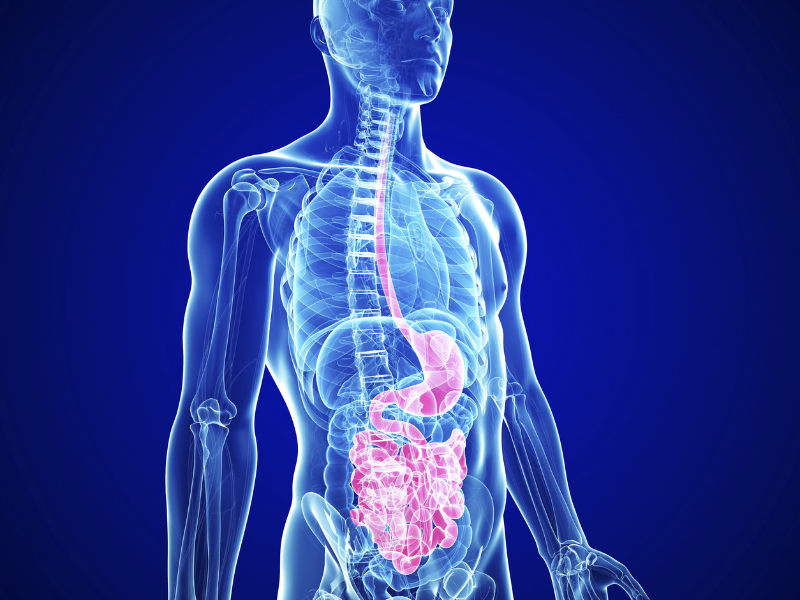
Gut Benefits of Chewing Gum
A healthy gut contributes to a strong immune system, heart health, brain health, improved mood, healthy sleep, and effective digestion, and it may help prevent some cancers and autoimmune diseases.
Aids Digestion
Proper digestion is vital for overall health and well-being. The digestive system is responsible for breaking down food into nutrients that the body uses for energy, growth, and cell repair.
How?
When you chew gum, it stimulates the production of saliva in the mouth, which plays an important role in the digestion process [1]. By chewing gum before a meal you can stimulate the release of salivary enzymes, which can help to start breaking down food even before you begin eating.
Research has shown that chewing gum after abdominal surgery can speed up the recovery of gastrointestinal function [2] This is thought to be due to the stimulation of the cephalic-vagal reflex through chewing, which in turn activates the vagus nerve, which is crucial for regulating digestive function, along with other bodily functions.
By activating the Vagus nerve, this triggers the parasympathetic nervous system (PNS) [3] and helps the body to enter into the rest and digest mode.
Reduces appetite and promotes feeling of satiety
When we feel full and satisfied after a meal, we are less likely to overeat or snack on unhealthy foods throughout the day. This can lead to better weight management, improved blood sugar control, and a reduced risk of chronic diseases such as type 2 diabetes and heart disease.
How?
It has been shown that chewing gum can help to stimulate the release of gut hormones that are involved in regulating appetite and satiety, such as glucagon-like peptide 1 (GLP-1) [4] [5]. These hormones work by signalling to the brain that the body is full and satisfied, reducing the desire to eat more. One particular study [4] showed that it can support satiation while in a fasted state.
Another study [6] found chewing gum significantly reduced hunger, the urge to eat, and the expected amount of food intake. It could be a potentially useful method for lowering high-carb snack consumption in the afternoon.
Chewing gum for up to 45 minutes after lunch decreases later snack intake, suppresses hunger returning after lunch, and lowers the cravings for sweet and salty snacks [7] .
Addition research [8] discovered that even sugar-free, flavourless gum could decrease hunger feelings and focus on food, which may help prevent unplanned eating.
Improves symptoms of acid reflux (heart burn)
When stomach acid flows back up into the esophagus, it can result in heartburn, difficulty swallowing, coughing, and a sour taste in the mouth.
Additionally, when stomach acid reaches the mouth, it can erode tooth enamel, disrupting the oral environment and leading to tooth decay and sensitivity [9].
How?
While chewing gum might seem like an unlikely solution for acid reflux, research has shown that it can actually help alleviate symptoms. It was found that chewing gum for 30 minutes after a meal reduced acid reflux symptoms in participants. This is because chewing gum stimulates the production of saliva, which can help neutralise stomach acid and reduce the risk of reflux [10].
However peppermint is linked to making symptoms worse - peppermint may inappropriately relax and open the lower oesophageal sphincter. This can allow gastric acid to flow up into the oesophagus. This may trigger symptoms of acid reflux.
Aids nausea
Nausea is a sensation of unease in the stomach, often accompanied by the urge to vomit. It can be caused by a variety of factors, including motion sickness, morning sickness, chemotherapy, and gastrointestinal disorders.
How?
Research has suggested that chewing gum may provide greater relief for nausea than prescription medication [11]. According to the study, approximately 75% of participants who chewed gum reported complete resolution of their nausea within 10 minutes. In contrast, only 37% of participants who received anti-nausea medication through an intravenous drip reported complete resolution of their nausea. These findings suggest that chewing gum could be a more effective and accessible option for those experiencing nausea.
There are a few theories as to how one is that it helps stimulate the digestive system and another is that the act of chewing gum increases saliva production, which can help neutralise stomach acid and reduce the feeling of queasiness.

